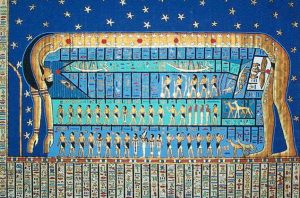Egypt culture facts, Astronomy and libraries as private properties
We are going to discuss some interesting Egypt culture facts. Do you know that the Astronomy in Egypt existed since ancient times till now? And also the libraries existed as a sign of Education and culture. Egypt culture: facts about Astronomy The Egyptians were fond of astronomy in order to predict the future and the mainly […]
Ancient knowledge transfer: Egyptian astronomy,
Adapted from an article by Exzellenzcluster Topoi. Egyptian astronomers computed the position of the planet Mercury using methods originating from Babylonia, finds a study of two Egyptian instructional texts from Oxford’s Ashmolean Museum. The study was carried out by Mathieu Ossendrijver, a historian of ancient science at Humboldt University Berlin and Exzellenzcluster Topoi, and Andreas Winkler, an Egyptologist at Oxford University’s Faculty of […]
HISTORY OF ASTRONOMICAL INSTRUMENTS
Keeping an eye on the heavens helps to keep track of time and events on the Earth. All the calendars and astronomical instruments rely on the sun and the moon, the two most important astronomical bodies for us on planet earth.. Astronomy also plays an essential role in the organization of societies in general. Understanding the cycles […]
Astronomy in Ancient Egypt
Abstract ‘Egypt has no place in a work on the history of mathematical astronomy.’ So declared Otto Neugebauer in his magisterial survey of the subject (1975, II: 559). And it is true that we have no surviving records of mathematical models and the precise predictive tables such as those found in the contemporaneous Babylonian civilization. […]
They believed stars were Gods… Ancient Egyptian Astronomy
Egyptian culture was greatly influenced by astronomy. Ancient Egyptian astronomy was very sacred. Pyramids and temples had been built and positioned in relation to the the stars. The Egyptian calendar was based on astronomical indicators as well. For example, when the brightest star in our sky, Sirius, rose before the Sun, the Egyptians knew their […]
Astronomy and Astrology in the Medieval Islamic World
The Study of Astronomy During the medieval period, scientists in the Islamic world made many contributions to the field of astronomy. While their work was based on ancient sources from Greece , and India, they updated methods for measuring and calculating the movement of heavenly bodies, and continued to develop models of the universe […]
Early Interpretation and Belief:
Egyptians aligned their pyramids and temples toward the north because they believed their pharaohs became stars in the northern sky after they died. To assure that a king would join the circumpolar stars, the pyramids were laid out facing due north toward the “indestructible” stars. They thought that aligning the pyramids toward north gave the […]
Astronomers discovered ancient Egyptian observations of a variable star
The study of the “Demon star”, Algol, made by a research group of the University of Helsinki, Finland, has received both scientific and public attention. The period of the brightness variation of this eclipsing binary star has been connected to good prognoses three millennia ago. This result has raised a lot of discussion and the […]
Astronomy
Like many ancient peoples, the Egyptians studied the night sky, taking measurements from the stars to accurately align their pyramids and sun temples with the earth’s four cardinal points. Taking sightings of the Great Bear and Orion with an instrument called a merkhet (similar to an astrolabe), astronomer-priests marked out the foundations of buildings with astonishing accuracy. The Great Pyramid […]
Ancient Egyptian Astronomy
One of the earliest advanced civilizations, Ancient Egypt, had a rich religious tradition which permeated every aspect of society. As in most early cultures, the patterns and behaviors of the sky led to the creation of a number of myths to explain the astronomical phenomena. For the Egyptians, the practice of astronomy went beyond legend. […]
